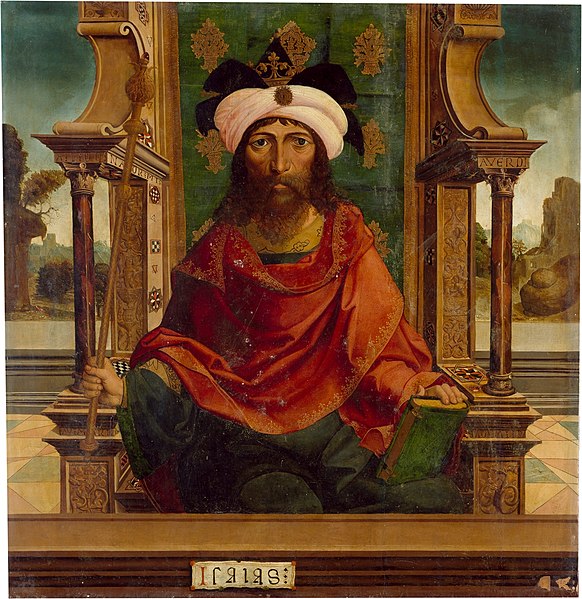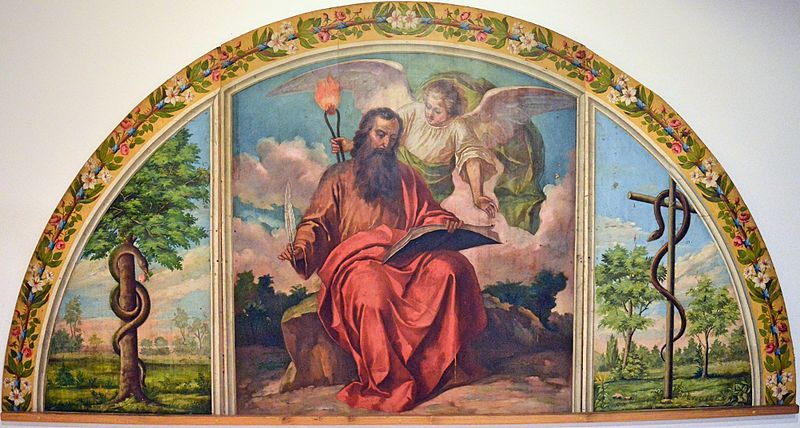Isaiah, a revered figure in both Jewish and Christian traditions, was an ancient prophet whose life and ministry spanned a crucial period in the history of ancient Israel and Judah.
Born around 740 BCE, Isaiah’s prophetic calling, recorded in the Book of Isaiah, marked the beginning of a remarkable journey as he delivered messages of judgment, hope, and redemption to the people of his time.
His most famous prophecies include the “Servant Songs,” which describe a mysterious figure chosen by God to bring salvation.
Isaiah’s enduring legacy continues to influence religious thought and literature, making him a central figure in the spiritual and cultural heritage of the Judeo-Christian tradition.
| Event | Date | Description |
|---|---|---|
| 8th century BCE | ~740 BCE | Birth of Isaiah |
| 8th century BCE | During the reign of King Uzziah of Judah | Isaiah’s prophetic calling (Isaiah 6:1-13) |
| 735-732 BCE | Reign of King Ahaz of Judah | Isaiah predicts the fall of the Northern Kingdom of Israel (Isaiah 7:1-17) |
| 735-732 BCE | Reign of King Ahaz of Judah | Isaiah’s Immanuel prophecy (Isaiah 7:14) |
| 701 BCE | Reign of King Hezekiah of Judah | Isaiah warns of Assyrian invasion and siege of Jerusalem (Isaiah 36-37) |
| 701 BCE | Reign of King Hezekiah of Judah | Miraculous defeat of the Assyrian army (2 Kings 19:35) |
| Unknown Dates | – | Isaiah delivers prophecies and oracles against various nations, including Babylon, Moab, and Assyria. |
| Unknown Dates | – | Isaiah offers messages of comfort and hope, including the “Servant Songs.” |
| Death and Legacy | ~680-670 BCE | Traditionally believed to be the time of Isaiah’s death |
| Death and Legacy | – | The Book of Isaiah is a compilation of his prophecies and oracles, considered one of the major prophetic books of the Old Testament. |
Timeline of Isaiah in the Bible
Birth of Isaiah (~740 BCE):
Isaiah, one of the prominent prophets in the Hebrew Bible (Old Testament), is believed to have been born around 740 BCE. He grew up during a critical period in the history of the kingdoms of Judah and Israel.

Prophetic Calling (During the reign of King Uzziah of Judah):
Isaiah’s prophetic calling is a pivotal moment in his life and ministry. It occurred during the reign of King Uzziah of Judah, who ruled from around 792 BCE to 740 BCE.
According to the biblical account in Isaiah 6:1-13, Isaiah experienced a profound vision in which he saw the Lord seated on a high throne, surrounded by seraphim. In this vision, Isaiah recognized his unworthiness and was cleansed by a burning coal, symbolizing his readiness to be a prophet.
Also Read: Facts About Isaiah in the Bible
The Lord then asked whom to send as a messenger, and Isaiah responded, “Here am I, send me.” This marked the beginning of Isaiah’s prophetic ministry, during which he would deliver messages and prophecies to the people of Judah and beyond.
Prediction of Israel’s Fall (735-732 BCE, during the reign of King Ahaz of Judah):
Isaiah’s prophetic ministry included predicting significant events in the history of Israel and Judah. One of his notable prophecies took place during the reign of King Ahaz of Judah, who ruled from approximately 735 to 715 BCE.
During this time, the Northern Kingdom of Israel (sometimes referred to as Ephraim) was facing a crisis. Isaiah delivered a message from the Lord predicting the fall of Israel. This prediction was part of a larger context of political instability and alliances in the region.
Also Read: Jeremiah Facts
The core of this prophecy is found in Isaiah 7:1-17, where Isaiah tells King Ahaz not to fear the alliance between Israel and Syria, assuring him that these kingdoms would not prevail against Judah.
He also speaks of a sign from the Lord—a virgin giving birth to a child named Immanuel—as a sign of God’s presence and protection. This prophecy is commonly known as the Immanuel prophecy (Isaiah 7:14).
Despite the assurance of God’s protection, Isaiah’s prophecy also contained a warning that the Assyrian Empire would eventually come against both Israel and Judah.

Warning of Assyrian Invasion (701 BCE, during the reign of King Hezekiah of Judah):
One of the most well-known episodes in Isaiah’s prophetic ministry is his warning regarding the Assyrian invasion of Judah, which occurred during the reign of King Hezekiah. Hezekiah ruled Judah from approximately 715 to 686 BCE, and his reign faced significant challenges, including the threat of the powerful Assyrian Empire.
In 701 BCE, the Assyrian king Sennacherib invaded Judah and laid siege to its capital, Jerusalem. Hezekiah, recognizing the dire situation, sought the counsel of Isaiah the prophet. Isaiah delivered a message from the Lord, assuring Hezekiah that God would protect Jerusalem and that the Assyrian siege would be unsuccessful.
According to the biblical account in 2 Kings 19 and Isaiah 37, during the night, the angel of the Lord struck down a large number of Assyrian soldiers, causing King Sennacherib to withdraw from Jerusalem. This event was seen as a miraculous deliverance, and it played a crucial role in strengthening Hezekiah’s faith and the faith of the people of Judah.
Miraculous Defeat of Assyrian Army (701 BCE, during the reign of King Hezekiah of Judah):
As mentioned above, the miraculous defeat of the Assyrian army in 701 BCE is a significant event associated with Isaiah’s ministry.
The defeat of the Assyrian army is traditionally attributed to divine intervention, with the biblical account emphasizing that the angel of the Lord struck down the Assyrian forces. This event is seen as a powerful demonstration of God’s protection over Jerusalem and His response to Hezekiah’s prayers.
Variobus Prophecies and Oracles (Dates Unknown):
Isaiah’s prophetic ministry extended beyond specific historical events. He delivered numerous prophecies and oracles against various nations, including Babylon, Moab, and Assyria, among others. These messages often contained warnings of judgment and consequences for the actions of these nations.
Isaiah’s prophecies against Babylon, for example, are found in Isaiah 13-14 and include vivid descriptions of Babylon’s downfall and the restoration of God’s people.

Messages of Comfort and Hope (Servant Songs, Dates Unknown):
Isaiah’s ministry was not solely focused on judgment and doom; he also delivered messages of comfort and hope. These messages are often referred to as the “Servant Songs” and are found in the Book of Isaiah.
The Servant Songs describe a figure known as the “Servant of the Lord” who would bring salvation and restoration. These passages emphasize qualities such as humility, suffering, and redemption.
The Servant Songs are among the most cherished and interpreted passages in the Book of Isaiah, and they have significant theological importance in both Jewish and Christian traditions.
Isaiah’s prophetic ministry included not only messages of judgment and doom but also messages of comfort, hope, and redemption. Some of the most famous passages in the Book of Isaiah are the “Servant Songs” that describe a mysterious figure known as the “Servant of the Lord.”
These Servant Songs are poetic passages that emphasize the unique qualities and mission of this Servant, who is chosen and anointed by God. They include:
Isaiah 42:1-4: This Servant is described as one who brings justice to the nations, not raising his voice in the streets, and who will not grow faint or be discouraged until justice is established.
Isaiah 49:1-6: The Servant is called from the womb to be a light to the nations, restoring Israel and bringing salvation to the ends of the earth.
Isaiah 50:4-9: This passage speaks of the Servant’s obedience, even in the face of suffering and opposition.
Isaiah 52:13-53:12: Often referred to as the “Suffering Servant” passage, this is perhaps the most famous of the Servant Songs. It describes the Servant’s suffering, rejection, and atonement for the sins of others.
Death of Isaiah (~680-670 BCE):
The exact date of Isaiah’s death is not recorded in the Bible, but it is traditionally believed to have occurred sometime around 680-670 BCE. His death marked the end of his prophetic ministry, but his legacy continued through his writings and teachings.
Legacy:
Isaiah’s legacy is profound and enduring. His prophetic book, consisting of 66 chapters, has had a significant impact on both Jewish and Christian theology and literature.
In Judaism, Isaiah is revered as one of the major prophets, and his writings are read and studied as part of the Hebrew Bible. His prophecies about the Messiah and the future restoration of Israel hold a central place in Jewish eschatology.
In Christianity, Isaiah is considered a major prophet as well, and his prophecies are often seen as pointing to the coming of Jesus Christ. Many passages from the Book of Isaiah are quoted in the New Testament, particularly in connection with the life, ministry, and mission of Jesus.
Isaiah’s messages of hope, justice, and the role of the suffering Servant continue to inspire believers and theologians alike. His teachings on righteousness, social justice, and the promise of redemption resonate with people across the centuries.
The Book of Isaiah is a testament to Isaiah’s enduring influence and the timeless nature of his messages. It remains a significant part of the religious and cultural heritage of the Judeo-Christian tradition.
Isaiah’s life and ministry, marked by a profound calling, a mix of warnings and comfort, and a lasting legacy, have left an indelible mark on the religious and literary history of the world. His words continue to be studied, cherished, and revered by people seeking spiritual guidance and inspiration.
